Ford Transit Transporter vs VW ID. Buzz Bus - Differences and prices compared
Compare performance (269 HP vs 340 HP), boot space and price (39900 £ vs 42900 £) at a glance. Find out which car is the better choice for you – Ford Transit Transporter or VW ID. Buzz Bus?
Costs and Efficiency:
Looking at overall running costs, both models reveal some interesting differences in everyday economy.
Ford Transit Transporter has a barely noticeable advantage in terms of price – it starts at 39900 £, while the VW ID. Buzz Bus costs 42900 £. That’s a price difference of around 2922 £.
In terms of energy consumption, the advantage goes to the VW ID. Buzz Bus: with 19 kWh per 100 km, it’s somewhat more efficient than the Ford Transit Transporter with 21.30 kWh. That’s a difference of about 2.30 kWh.
As for range, the VW ID. Buzz Bus performs noticeable better – achieving up to 485 km, about 168 km more than the Ford Transit Transporter.
Engine and Performance:
Under the bonnet, it becomes clear which model is tuned for sportiness and which one takes the lead when you hit the accelerator.
When it comes to engine power, the VW ID. Buzz Bus has a noticeable edge – offering 340 HP compared to 269 HP. That’s roughly 71 HP more horsepower.
In terms of top speed, the VW ID. Buzz Bus performs clearly perceptible better – reaching 160 km/h, while the Ford Transit Transporter tops out at 120 km/h. The difference is around 40 km/h.
There’s also a difference in torque: VW ID. Buzz Bus pulls evident stronger with 679 Nm compared to 430 Nm. That’s about 249 Nm difference.
Space and Everyday Use:
Cabin size, boot volume and payload all play a role in everyday practicality. Here, comfort and flexibility make the difference.
Seats: Ford Transit Transporter offers to a small extent more seating capacity – 6 vs 5.
In curb weight, Ford Transit Transporter is to a small extent lighter – 2074 kg compared to 2400 kg. The difference is around 326 kg.
In maximum load capacity, the Ford Transit Transporter performs convincingly better – up to 14100 L, which is about 11895 L more than the VW ID. Buzz Bus.
When it comes to payload, Ford Transit Transporter decisively takes the win – 2607 kg compared to 600 kg. That’s a difference of about 2007 kg.
Who wins the race?
The Ford Transit Transporter proves to be shows small but notable strengths and therefore becomes our DriveDuel Champion!
Ford Transit Transporter is the better all-rounder in this comparison.

Ford Transit Transporter
Costs and Consumption
View detailed analysis
Engine and Performance
View detailed analysis
Dimensions and Body
View detailed analysis
Ford Transit Transporter
The Ford Transit is the no-nonsense workhorse that turns heavy-duty hauling into a surprisingly civilized experience, with a cabin that favors practicality over pretense. It’s the go-to for tradespeople and fleet managers who want reliability, adaptability and low running headaches — not showy gimmicks.
details


VW ID. Buzz Bus
The VW ID. Buzz revives the classic camper van vibe with a modern electric twist, offering plush space and a friendly, futuristic face that stops traffic. It’s clearly built for weekend escapes and city runs alike, with clever interior details that make it as practical as it is charming.
details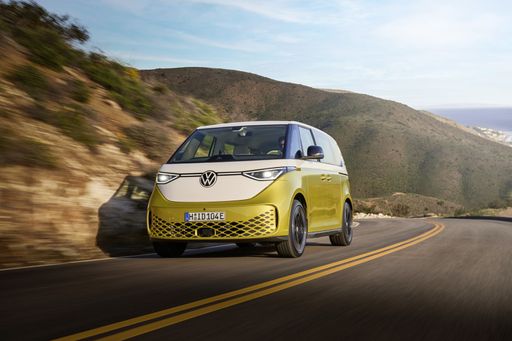
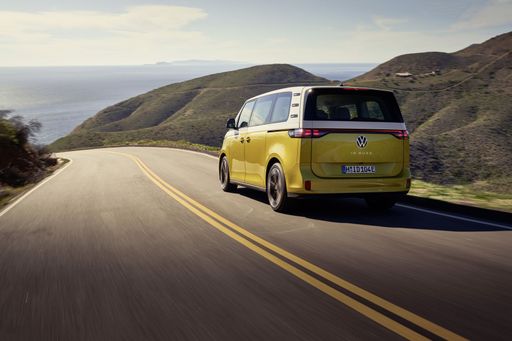



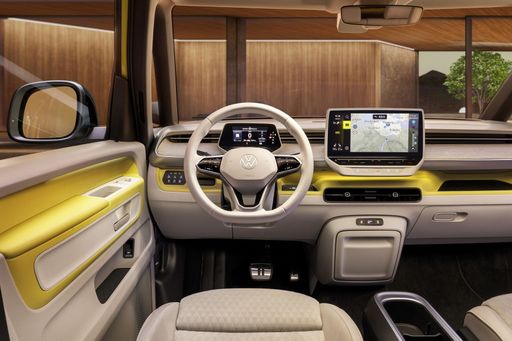
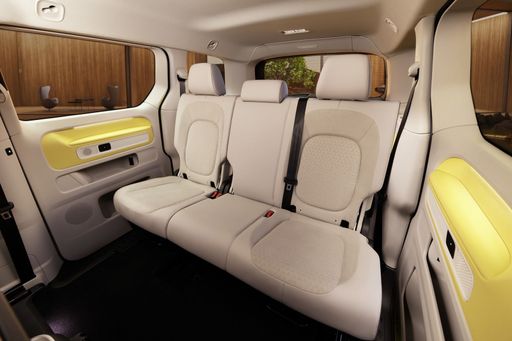
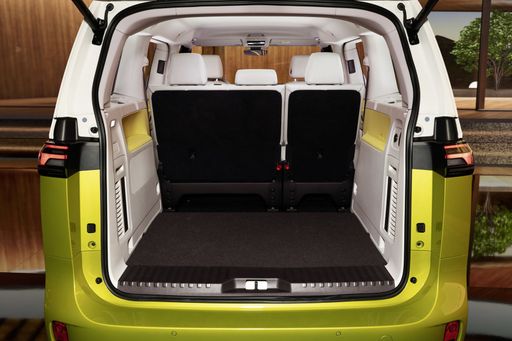
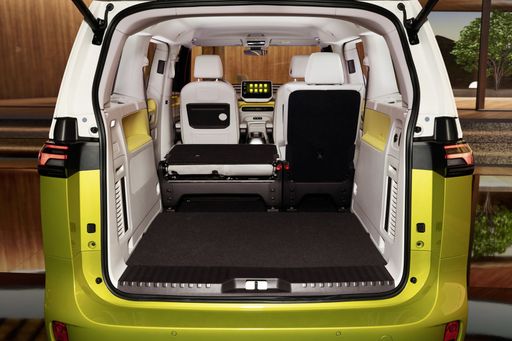

|

|
|
|
|
Costs and Consumption |
|
|---|---|
|
Price
39900 - 69100 £
|
Price
42900 - 64200 £
|
|
Consumption L/100km
7.9 - 10.3 L
|
Consumption L/100km
-
|
|
Consumption kWh/100km
21.3 - 32 kWh
|
Consumption kWh/100km
19 - 20.6 kWh
|
|
Electric Range
247 - 317 km
|
Electric Range
329 - 485 km
|
|
Battery Capacity
68 kWh
|
Battery Capacity
59 - 86 kWh
|
|
co2
0 - 270 g/km
|
co2
0 g/km
|
|
Fuel tank capacity
70 L
|
Fuel tank capacity
-
|
Dimensions and Body |
|
|---|---|
|
Body Type
Cargo Van
|
Body Type
Bus
|
|
Seats
3 - 6
|
Seats
5
|
|
Doors
4
|
Doors
5
|
|
Curb weight
2074 - 2765 kg
|
Curb weight
2400 - 2780 kg
|
|
Trunk capacity
-
|
Trunk capacity
1121 - 1340 L
|
|
Length
5531 - 6704 mm
|
Length
4712 - 4962 mm
|
|
Width
2059 mm
|
Width
1985 mm
|
|
Height
2530 - 2778 mm
|
Height
1924 - 1927 mm
|
|
Max trunk capacity
9300 - 14100 L
|
Max trunk capacity
2205 L
|
|
Payload
735 - 2607 kg
|
Payload
462 - 600 kg
|
Engine and Performance |
|
|---|---|
|
Engine Type
Diesel, Electric
|
Engine Type
Electric
|
|
Transmission
Manuel, Automatic
|
Transmission
Automatic
|
|
Transmission Detail
Manual Gearbox, Automatic Gearbox, Reduction Gearbox
|
Transmission Detail
-
|
|
Drive Type
Front-Wheel Drive, Rear-Wheel Drive, All-Wheel Drive
|
Drive Type
Rear-Wheel Drive, All-Wheel Drive
|
|
Power HP
105 - 269 HP
|
Power HP
170 - 340 HP
|
|
Acceleration 0-100km/h
-
|
Acceleration 0-100km/h
6.1 - 10.7 s
|
|
Max Speed
120 km/h
|
Max Speed
145 - 160 km/h
|
|
Torque
310 - 430 Nm
|
Torque
310 - 679 Nm
|
|
Number of Cylinders
4
|
Number of Cylinders
-
|
|
Power kW
77 - 198 kW
|
Power kW
125 - 250 kW
|
|
Engine capacity
1996 cm3
|
Engine capacity
-
|
General |
|
|---|---|
|
Model Year
2019 - 2024
|
Model Year
2024
|
|
CO2 Efficiency Class
G, A
|
CO2 Efficiency Class
A
|
|
Brand
Ford
|
Brand
VW
|
What drivetrain options does the Ford Transit Transporter have?
Available configurations include Front-Wheel Drive, Rear-Wheel Drive or All-Wheel Drive.
The prices and data displayed are estimates based on German list prices and may vary by country. This information is not legally binding.
